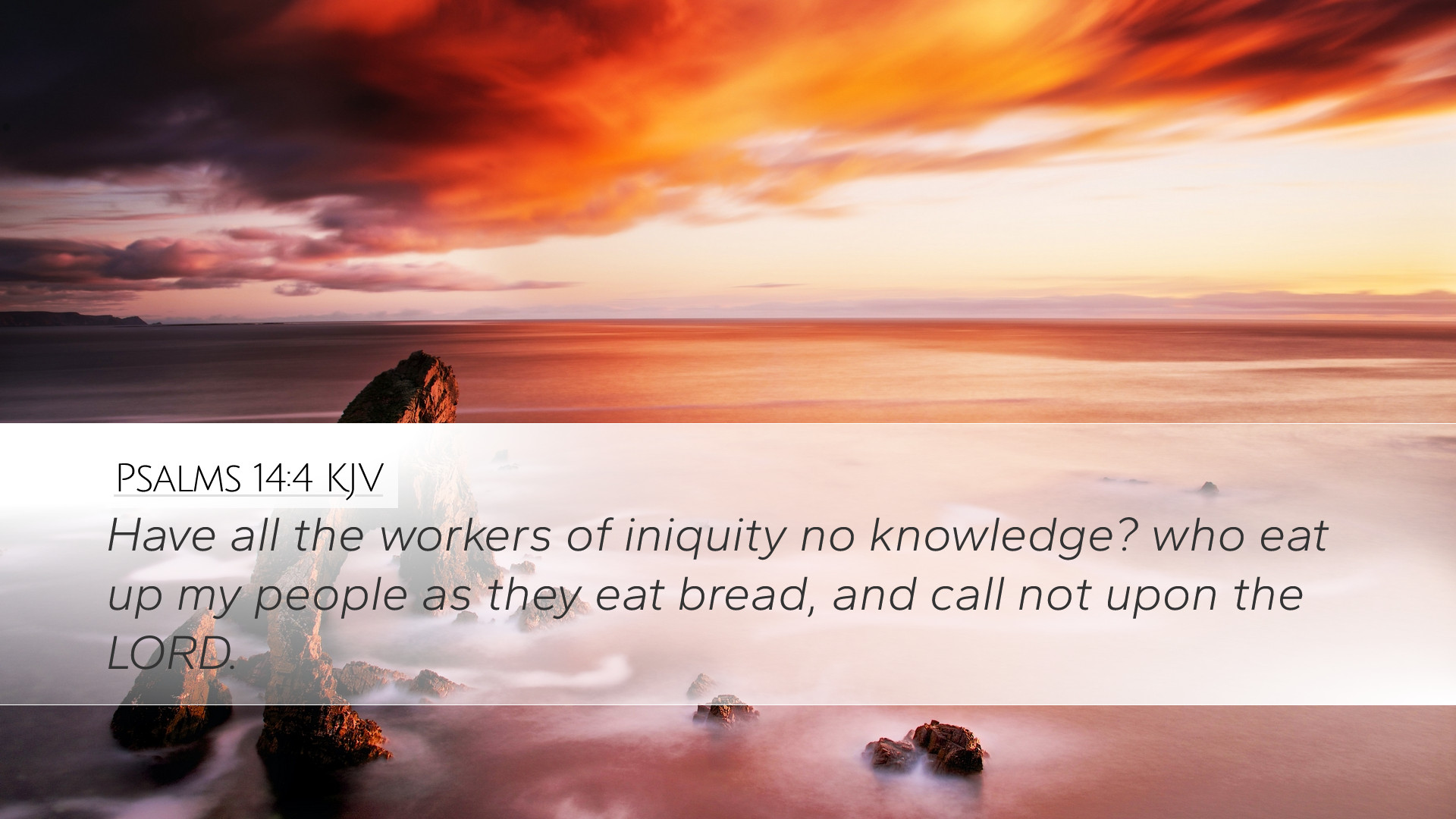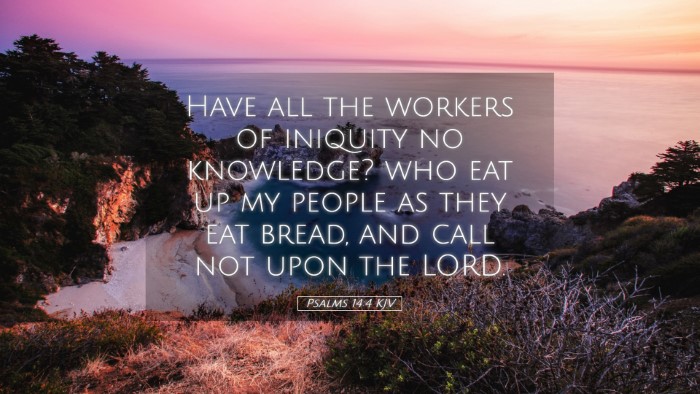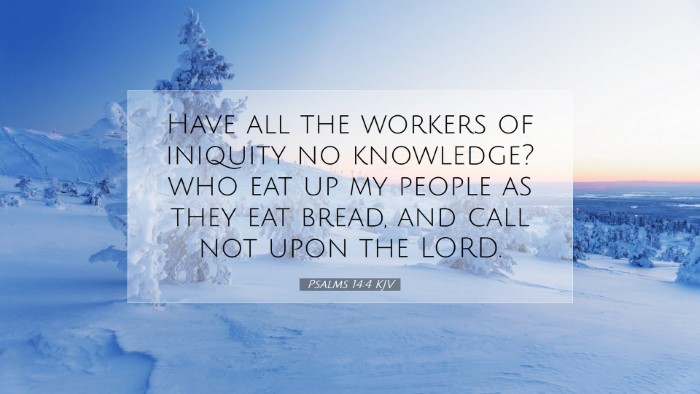Psalms 14:4 Commentary
Verse Reference: Psalms 14:4 - "Have all the workers of iniquity no knowledge? who eat up my people as they eat bread, and call not upon the LORD."
Introduction
This verse from Psalms 14 presents a poignant critique of those who engage in wickedness and displays a profound theological reflection on human depravity. The psalmist, traditionally attributed to David, raises a rhetorical question that highlights the ignorance of evil-doers. This commentary integrates insights from renowned public domain scholars, including Matthew Henry, Albert Barnes, and Adam Clarke, offering a multi-faceted understanding of the text.
Context and Overall Themes
The Book of Psalms serves various purposes, including personal lament, communal prayers, and expressions of praise. Psalms 14 specifically emphasizes the condition of mankind, particularly the folly of those who reject God. The psalm opens with a proclamation that “the fool hath said in his heart, There is no God.” This declaration forms the backdrop against which verse 4 is presented, portraying the horrors wrought by those devoid of divine knowledge.
The Workers of Iniquity
“Have all the workers of iniquity no knowledge?” Here, the psalmist interrogates the moral and spiritual blindness of those who perpetuate evil. Matthew Henry notes that the term "workers of iniquity" refers to those who commit sins with great zeal and effort, showcasing a lifestyle devoted to rebellion against God. These individuals not only reject divine authority but also actively oppose the righteous by preying upon the innocent.
The Ignorance of the Wicked
This rhetorical question serves not only as an inquiry but as a condemnation. Albert Barnes elaborates, noting that true knowledge begins with a recognition of the Divine. Those who live in rebellion exhibit a profound lack of understanding. Their ignorance leads them to consume “my people as they eat bread,” suggesting a casual and thoughtless disposition towards the suffering they cause. This phrase indicates the ease and gluttony with which the wicked exploit the vulnerable; it highlights a stark contrast to the sacredness of life that should instead be upheld.
The Imagery of Consumption
The metaphor of eating is significant. Adam Clarke comments that just as bread is essential for physical sustenance, the wicked consume the lives and well-being of others for their own gain. This imagery further emphasizes their gluttony and the dehumanization of their victims, indicating a troubling indifference towards the consequences of their actions. This serves as a sober reminder of the extent to which human depravity can manifest itself in society.
The Call to Trust in God
In the latter part of the verse, “and call not upon the LORD,” the psalmist underscores the direct correlation between the acknowledgment of God and moral behavior. The refusal to invoke the Lord’s name shows an intentional distancing from divine guidance. Henry reflects on the significance of prayer as a recognition of the Lord’s authority and power; without such acknowledgment, moral depravity is inevitable.
Implications for Believers
This verse serves as both a warning and an exhortation for believers. It challenges them to be vigilant against the allure of iniquity and to remain steadfast in their faith and dependence on God. Barnes encourages believers to recognize the consequences of rejecting divine authority, not only for individual souls but for society as a whole. He notes the importance of calling upon the Lord as a means of empowerment against the treachery of iniquity.
Theological Reflections
Psalms 14:4 invites theological reflection on the nature of sin and the human condition. The presumption of knowledge among sinners is profound; they have pursued their paths in ignorance of both God’s sovereignty and the impending judgment. Clarke emphasizes that all human knowledge devoid of the acknowledgment of God is ultimately futile, as the fear of the Lord is the beginning of wisdom (Proverbs 1:7).
The Sovereignty of God
In this context, the psalmist’s lamentation invites an understanding of God’s sovereignty over both the righteous and the wicked. God remains aware of the actions of all; the seeming triumph of evil is temporary and will be confronted by divine justice. Believers are called to rest in the assurance that God observes and will one day rectify all inequities.
The Call to Action
This verse not only paints a grim picture of the wicked but also serves as a catalyst for action. Believers are encouraged to remain in fervent prayer, recognizing that such spiritual discipline aligns their hearts with God’s will. The invitation to call upon the Lord is both a comfort and a directive, reinforcing the power of prayer in combating evil and fostering communal righteousness.
Conclusion
Psalms 14:4 presents a stark reality of human nature, encapsulating the theological essence of sin, ignorance, and the urgent need for divine recognition. The insights from Matthew Henry, Albert Barnes, and Adam Clarke converge to illuminate the text, offering invaluable guidance for leaders and scholars alike. In a world where the “workers of iniquity” might seem prevalent, this verse continually calls the people of God to seek wisdom, engage in prayer, and trust in the sovereign Lord whose justice will ultimately prevail.
Reflection Questions
- How can we better cultivate a recognition of God's sovereignty in our lives?
- In what ways can we respond to the call of this psalm in prayer and action against injustice?
- What practices might help guard against the “foolishness” described in the first verse of this psalm?


